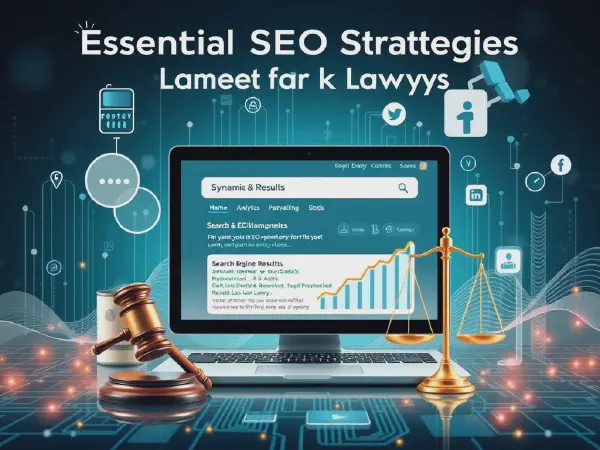Essential SEO Strategies for Lawyers to Boost Visibility

The Ultimate Guide to SEO For Lawyers
In today's digital age, effective online marketing is essential for lawyers to attract potential clients. SEO For Lawyers is not just a trend; it is a crucial strategy that can significantly impact a law firm's visibility, reputation, and overall success. By implementing targeted SEO strategies, lawyers can improve their online presence, drive more traffic to their websites, and convert visitors into clients.
SEO For Lawyers involves optimizing a law firm’s website and online content to rank higher in search engine results, making it easier for potential clients to find the services they need. This encompasses various techniques, including keyword research, on-page and off-page SEO, local SEO, and content marketing tailored specifically for legal professions. As the legal market becomes increasingly competitive, investing in effective SEO strategies is becoming indispensable for law firms.
While SEO may seem challenging for lawyers who are preoccupied with their practice, understanding the essentials and leveraging the expertise of SEO professionals can provide immense benefits. From understanding how clients search for legal services to measuring the effectiveness of SEO campaigns, lawyers can transform their online presence and enhance their client engagement.
Moreover, SEO For Lawyers does not only cater to attracting new clients but also focuses on building a law firm’s credibility and authority in the legal field. Effective SEO strategies ensure that law firms stand out in search results, convey trustworthiness, and create meaningful connections with prospects. Therefore, an investment in SEO not only pays off in leads but also enhances a firm's reputation.
For targeted digital growth in Manitoba, exploring the unique offerings of Centillion Marketing Winnipeg SEO is essential.
In this comprehensive guide, we will explore the importance of SEO for law firms, effective on-page and off-page SEO techniques, local SEO strategies, and content marketing approaches tailored for legal professionals, providing the insights and strategies needed for success in today's competitive legal landscape.
Importance of SEO for Law Firms
Understanding client search behavior is fundamental to effective SEO for lawyers. Potential clients often turn to search engines like Google to find legal assistance, and understanding the specific terms and phrases they use can help law firms effectively position themselves in search results. This means conducting thorough keyword research, analyzing client intents, and adapting legal services promoting strategies accordingly.
Businesses seeking to enhance their online presence can greatly benefit from strategies implemented by Centillion Marketing.
Local SEO is particularly beneficial for lawyers, as most clients look for legal services within their vicinity. By optimizing local search strategies, lawyers can ensure that their practice appears prominently in local searches, thereby increasing foot traffic and consultations from nearby clients. A strong local SEO strategy involves claiming and optimizing Google My Business listings, gathering local reviews, and ensuring consistent NAP (Name, Address, Phone number) information across various platforms.
SEO greatly impacts client acquisition for law firms. A well-optimized website provides a positive user experience, encourages engagement, and ultimately leads to higher conversion rates. Law firms employing effective SEO strategies often report an uptick in inquiries and business consultations, which can lead to sustained growth and success. Moreover, as online trust increases, so does the likelihood of potential clients choosing those firms over competitors who are less visible online.
Measuring SEO success for law firms involves monitoring a variety of metrics, including website traffic, keyword rankings, lead conversion rates, and user engagement levels. Utilizing tools such as Google Analytics and Search Console can help lawyers gain insight into their website's performance and identify areas for improvement. Regular analysis and adjustment of SEO strategies based on these metrics ensure that law firms continue to meet their online marketing goals.
On-Page SEO Techniques for Lawyers
Keyword research strategies for legal practices are vital as they lay the groundwork for all SEO efforts. Lawyers should focus on identifying keywords that potential clients are searching for, including practice areas and location-specific terms. Long-tail keywords—phrases that are more specific and typically longer—often yield better conversion rates as they align more closely with client intents.
Creating SEO-friendly content for legal niches requires careful consideration of both the legal terminology and the readability for laypersons. Writing informative articles, blogs, and resources that address common legal questions helps provide value to clients while optimizing content for relevant keywords, increasing the chances of ranking higher in search results.
Meta tags and title optimization play a crucial role in the on-page SEO landscape. Each page of a law firm's website should have unique meta titles and descriptions including relevant keywords, which can enhance the click-through rate in search results. Best practices include keeping titles concise and making them compelling to encourage prospective clients to visit the site.
Best practices for law firm websites encompass various elements, from mobile optimization to ensuring fast loading speeds. A well-structured website with clear navigation enhances the user experience, encouraging visitors to explore more. Additionally, implementing SSL certification not only secures client information but also signals credibility to search engines, contributing positively to SEO rankings.
Off-Page SEO Strategies for Legal Professionals
Building backlinks in the legal industry is a strategic way to improve SEO. High-quality backlinks from reputable sources can enhance a law firm's authority and credibility in the eyes of search engines. Engaging in partnerships with legal blogs, industry associations, and relevant websites while ensuring backlinks naturally fit within context can greatly impact rankings.
Leveraging social media for SEO offers lawyers an opportunity to expand their reach and engage with potential clients. By sharing valuable content and legal insights on platforms like LinkedIn, Facebook, and Twitter, law firms can drive traffic to their websites and improve brand recognition, fostering a community of followers who may turn into clients.
Guest blogging opportunities for lawyers can serve as an excellent off-page SEO strategy, allowing legal professionals to share their expertise and insight across various platforms. By contributing high-quality articles to reputable legal blogs, firms can gain exposure, build backlinks, and position themselves as authoritative voices in their respective practice areas.
Online reputation management is essential for law firms to control their image in the digital landscape. Soliciting reviews from satisfied clients and responding constructively to negative feedback can help maintain a strong online presence. Monitoring and managing online reputation contributes significantly to improving visibility and attracting prospective clients, ultimately making SEO efforts more effective.
Local SEO for Lawyers
Optimizing Google My Business for law firms is a fundamental aspect of local SEO. Creating and maintaining an accurate and complete Google My Business profile enhances the chances of appearing in local search results and Google Maps, directly impacting client acquisition. This includes providing essential information such as business hours, contact information, and services offered.
The importance of local citations and directories cannot be overstated. Being listed on local legal directories, relevant business listings, and legal forums can improve local search rankings. Consistent NAP information across all directories and citations is vital, as discrepancies can confuse search engines and harm a firm's visibility.
Gathering and managing client reviews is crucial for local SEO efforts. Encouraging clients to leave positive reviews on platforms like Google and Yelp not only enhances online reputation but also contributes to local search rankings. Responding to reviews, both positive and negative, demonstrates a commitment to client satisfaction and can further attract new clients.
Local keyword targeting strategies help law firms effectively reach potential clients within their geographic area. Tailoring website content and service pages to include local keywords, such as city names and regional terms, makes it easier for search engines to connect the law firm with localized searches, significantly enhancing visibility.
Content Marketing for Law Firms
Developing a blog strategy for legal topics allows law firms to showcase their knowledge and engage potential clients. By providing informative and relevant blog content, law firms can address common issues, answer questions, and establish trust with readers, potentially leading to conversions as visitors seek legal assistance.
Utilizing FAQs to improve SEO is a practical approach, as clients frequently search for answers to specific legal questions. By incorporating frequently asked questions with clear, useful responses on their websites, law firms can target relevant keywords and increase their chances of ranking for those queries, enhancing visibility and credibility in search results.
Creating informative resources for potential clients—such as guides, eBooks, and checklists—can serve as valuable incentives for email sign-ups and consultations. Such resources not only enhance client trust but also provide opportunities to target long-tail keywords for better search result positioning.
Video content and SEO for lawyers can significantly enhance client engagement. Creating informative videos discussing legal topics, client testimonials, or firm introductions and optimizing them for SEO can capture a wider audience on platforms like YouTube. Video content boosts engagement rates and can result in higher website traffic, positively influencing SEO outcomes.
